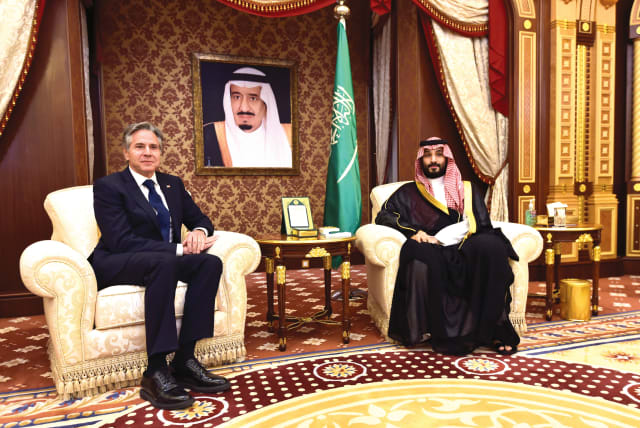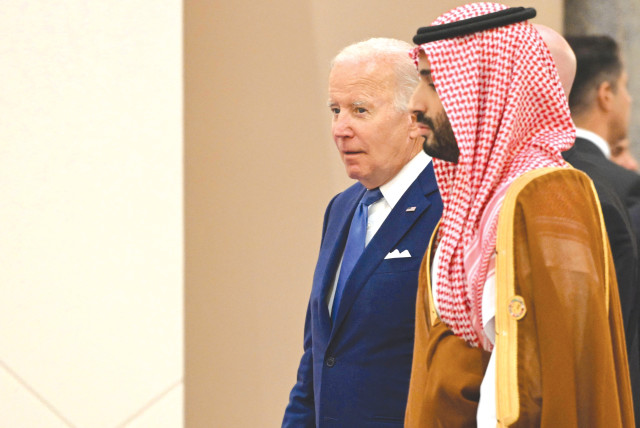Leading with the Private Sector in Israeli-Saudi Normalization - opinion

Achieving Saudi-Israeli normalization will take years of positive contact between Israelis and Saudis in order to counteract decades of demonization.
When I last visited the Saudi National Museum in Riyadh it had the following story etched into the wall of its entrance hall:
“The Prophet Muhammad, when a boy of 12, accompanied his uncle Abu-Talib on a camel caravan bound for Damascus. In the Syrian desert, the caravan passed the abode of a Christian monk who invited the merchants to dinner.
"This monk recognized the signs that the young Muhammad would one day become a great prophet. The monk pulled Abu-Talib aside to warn him that the Jews would also recognize the signs.
"The Jews would seek to murder the boy in Damascus, the monk warned, to prevent his future prophecy. Sure enough, the Jews’ plans to murder the Prophet were thwarted, thanks to this timely warning.”
The story (in Arabic) is not in the Koran and was written down hundreds of years after the Prophet’s lifetime. Nevertheless, it was seen by the many Saudi schoolchildren who visited the museum on field trips.
This anecdote is intended to illustrate that achieving Saudi-Israeli normalization will take years of positive contact between Israelis and Saudis in order to counteract decades of demonization. Saudi institutions have drawn on the negative portrayals of Jews found in their religious tradition (ignoring positive portrayals that also exist).
These portrayals persist in the popular culture in Saudi Arabia and elsewhere in the Arab world, including long-time treaty partners of Israel like Egypt and Jordan. I frequently ran into them while serving for over 20 years in the Arab world as a US diplomat – including in Saud Arabia.
The good news for eventual Saudi Arabia-Israel normalization is the potential synergy between the two countries economies (the largest and fourth largest in the Middle East, respectively). That synergy – between Saudi finance and planning and Israeli technology and entrepreneurship – offers potential common ground on a positive agenda.
The US as a mediator
The best thing that the US government can do is to let Saudi and Israeli business people explore the synergy without interference, encouraging the Saudi side and, where needed, providing seed capital for joint ventures.
Saudi Arabia is a complex, multi-ethnic country, the size of the western United States, different from the Gulf city-states that signed the Abraham Accords.
Among its complexities is that alongside an antisemitic popular culture is the potentially most philo-semitic segment of population in the entire Arab world – several hundred thousand university graduates educated in the US, a result of Saudi education policy since the oil boom of the early 1970s.
This English-speaking technocratic elite runs the government agencies, the financial institutions, and the major businesses and meets with visiting American delegations (including most recently pro-Israel ones). Some of these Saudis had American Jewish friends, classmates, and professors during their time in the US and many appear willing to lean into a direct relationship with Israel.
But this Saudi technocratic elite doesn’t guide the country’s popular culture, let alone its politics – any more than the Israeli hi-tech sector in Tel Aviv directs Israel’s politics.
Though they are absolute monarchs, Saudi Arabia’s king and crown prince pay close attention to popular sentiment, especially on sensitive issues like relations with Israel – and they know not to test unnecessary limits (which caused reforming predecessors in Saudi Arabia and elsewhere to be assassinated.)
Governmental relations between Israel and Saudi Arabia are gradually increasing, especially in the military realm, thanks to the intermediation of the US Central Command, driven by shared interests in deterring Iran. There is no urgency there, no need for another White House signing ceremony of another agreement.
If there is urgency, it comes from US politics as the Biden administration seeks a foreign policy achievement in its fourth year. But Americans should have learned by now (after Bill Clinton’s Camp David summit in 2000 and John Kerry’s peace initiative in 2014, among others) that attempts to force the Middle East onto a US presidential four-year cycle often ends in failure or worse, as in the Second Intifada.
Let’s also admit that the US Government’s decades of effort to stimulate trade and investment between Israel and its Arab treaty partners have been a failure. Two-way trade between Egypt and Israel – the subject of intense US government focus since the 1979 peace treaty – is stuck at less than $200 million per year (including Egypt’s purchase of Israeli natural gas).
Benefits of normalization
Meanwhile, without any special governmental incentives of any kind, two-way trade between Turkey and Israel will top $8 billion this year, the largest trading relationship in the Middle East.
If Saudi Arabia and Israel allow business ties, business people will find each other and make deals. With business comes employment and familiarity with products and people.
Over time, the portrayal of Jews in Saudi society will become more diverse, with positive remembrances of Jewish-Muslim interactions emerging from a long shared history. We should have the strategic patience to let this process take its time, at a Middle Eastern pace.
The Biden administration wants to create another permanent position at the State Department to oversee Israel-Arab normalization, alongside an already robust bureaucracy that is supposed to be doing exactly that. Before approving it, Congress should ask how this new special envoy plans to let the private sector lead.
Jerusalem Post Store
`; document.getElementById("linkPremium").innerHTML = cont; var divWithLink = document.getElementById("premium-link"); if (divWithLink !== null && divWithLink !== 'undefined') { divWithLink.style.border = "solid 1px #cb0f3e"; divWithLink.style.textAlign = "center"; divWithLink.style.marginBottom = "15px"; divWithLink.style.marginTop = "15px"; divWithLink.style.width = "100%"; divWithLink.style.backgroundColor = "#122952"; divWithLink.style.color = "#ffffff"; divWithLink.style.lineHeight = "1.5"; } } (function (v, i) { });

